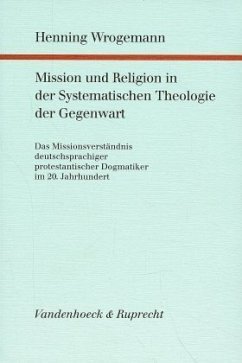Mission and Religion in the Systematic Theology of the Present. Mission Understanding of German-speaking Protestant Dogmatists in the 20th Century. 350 p. (Text in German) This study provides a much-needed overview of the main developments in the theory and practice of Christian mission in this century. The author seeks to develop a truly contemporary understanding of the Christian mission which does justice both to the necessity of understanding strangers and of integrating Christian witness into the dialogue with them.Immer mehr Gesellschaften - nicht nur der westlichen Welt - haben in den letzten Jahren zunehmend ein multikulturelles und multireligiöses Gepräge bekommen. Das wirft die Frage neu auf, wie Christen Menschen fremder Kultur, Weltanschauung und Religion begegnen sollen. Henning Wrogemann untersucht unter dieser Fragestellung das Missionsverständnis, wie es sich aus den Arbeiten führender deutscher Dogmatiker des 20. Jahrhunderts ergibt. Wie kann christliche Mission dem Verstehen der Fremden dienen und dazu beitragen, ihnen respektvoll zu begegnen, ohne jedoch den eigenen Wahrheitsanspruch zu verleugnen? Wie verhalten sich Mission und Dialog zueinander und welches Verständnis von 'Mission' und 'Dialog' ist eigentlich gemeint? In der Analyse werden verschiedene Modelle eines zeitgemäßen Missionsverständnisses herausgearbeitet. Die Arbeit schließt mit dem Versuch, diese Ansätze in Richtung auf ein Verständnis von Mission als einer 'Hermeneutik des Fremden' weiterzuentwickeln.

